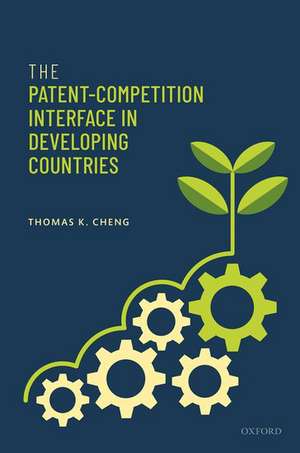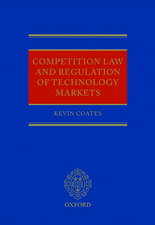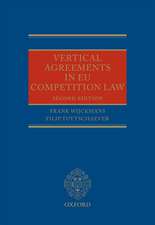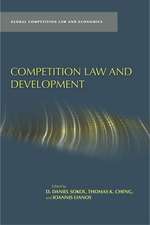The Patent-Competition Interface in Developing Countries
Autor Thomas K. Chengen Limba Engleză Hardback – 16 dec 2021
Preț: 766.96 lei
Preț vechi: 884.38 lei
-13% Nou
Puncte Express: 1150
Preț estimativ în valută:
146.80€ • 159.52$ • 123.40£
146.80€ • 159.52$ • 123.40£
Carte disponibilă
Livrare economică 19-25 martie
Preluare comenzi: 021 569.72.76
Specificații
ISBN-13: 9780192857354
ISBN-10: 0192857355
Pagini: 544
Dimensiuni: 165 x 240 x 33 mm
Greutate: 0.95 kg
Editura: OUP OXFORD
Colecția OUP Oxford
Locul publicării:Oxford, United Kingdom
ISBN-10: 0192857355
Pagini: 544
Dimensiuni: 165 x 240 x 33 mm
Greutate: 0.95 kg
Editura: OUP OXFORD
Colecția OUP Oxford
Locul publicării:Oxford, United Kingdom
Recenzii
In this illuminating monograph, Thomas Cheng offers valuable and nuanced insights into the significance of the patent-competition interface in developing countries. He skillfully explores the different trade-offs and technological capacities that characterize developing countries, and the way these ought to affect policy choices and implementation. A significant and detailed contribution to our understanding of the role of innovation and technology in developing countries, and the means to optimize them.
Patent policy is supposed to incentivize innovation and commercialization of new goods in return for a period of exclusive use, which could support monopoly power. Competition policy is aimed partially at offsetting this power to safeguard the interests of consumers. This inherent tension has long been evident in rich and technologically advanced countries. However, few scholars have analyzed the relevant tradeoffs in developing economies, where innovation and purchasing power are fundamentally different. Thomas Cheng's book is a comprehensive and novel treatment of these complex issues, combining deep legal scholarship with a sound understanding of economic incentives to craft a rich and nuanced approach to this vital, yet so far neglected, policy frontier. This is a landmark volume, which should be read closely by all scholars in intellectual property, competition, and innovation economics.
Patent policy is supposed to incentivize innovation and commercialization of new goods in return for a period of exclusive use, which could support monopoly power. Competition policy is aimed partially at offsetting this power to safeguard the interests of consumers. This inherent tension has long been evident in rich and technologically advanced countries. However, few scholars have analyzed the relevant tradeoffs in developing economies, where innovation and purchasing power are fundamentally different. Thomas Cheng's book is a comprehensive and novel treatment of these complex issues, combining deep legal scholarship with a sound understanding of economic incentives to craft a rich and nuanced approach to this vital, yet so far neglected, policy frontier. This is a landmark volume, which should be read closely by all scholars in intellectual property, competition, and innovation economics.
Notă biografică
Thomas Cheng is an associate professor at the University of Hong Kong. He has written extensively on competition law in developing countries and on the competition law of a number of Asian jurisdictions, including Hong Kong, China, and Japan. His research has appeared in respected specialist U.S. journals, including Chicago Journal of International Law, Berkeley Business Law Journal, Virginia Law & Business Review, and University of Pennsylvania Journal of Business Law, and in leading competition law journals such as Journal of Antitrust Enforcement and World Competition. In 2020, he published Competition Law in Developing Countries, with Oxford University Press.





















